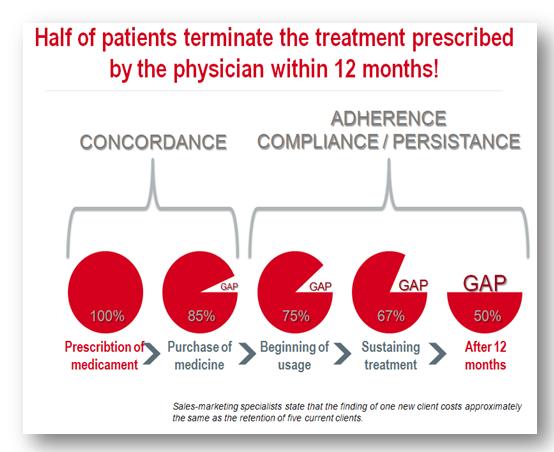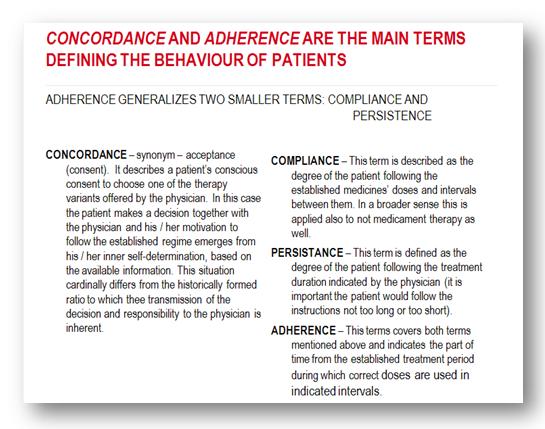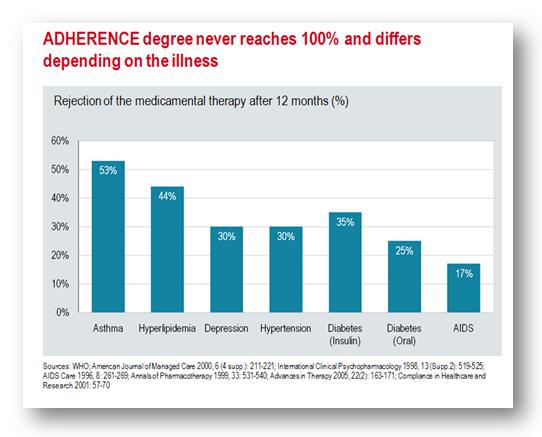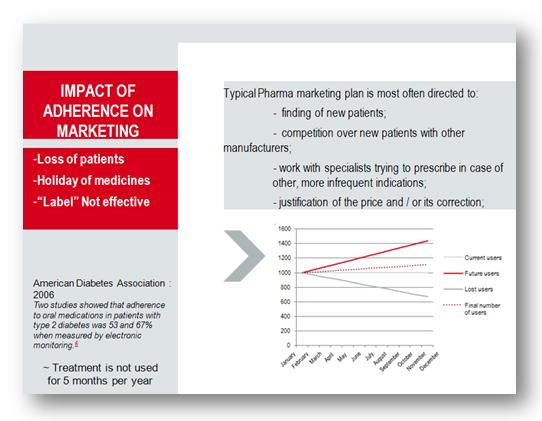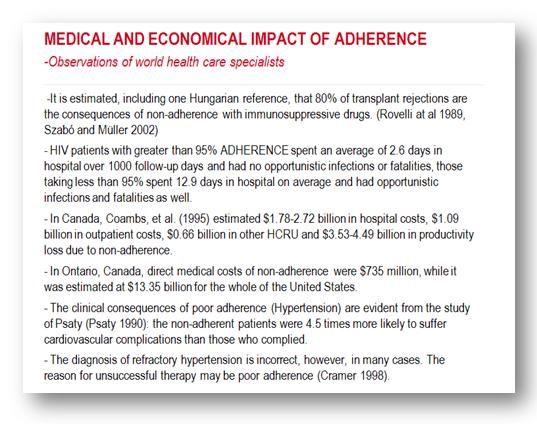
Assumptions for the NA project
It would be the most simple to conclude an agreement with a private family physicians’ clinics and to examine the required indication regarding how patients follow the treatment regime in real life.
For example, in the group of those ill with hypertension:
- A. Let’s count the amount and type of medicines bought in drug stores within the last 12 months (prescription books) and how many medicines had to be bought following recommendations (you may narrow the circle of the exploratories right away: you may research only those who fail to achieve the optimum blood pressure indicators).
- B. Make a questionnaire (you will find it in the Internet) and survey those patients. The nurses of the clinics will willingly perform both tasks. You will only have to help them to prepare methodology and to help the clinics to cover the research expenses. All this will be legal and interesting in the medical sense for your clients. If you will record the blood pressure of those patients as well, it will look like you are able to have adherence with the clinical results of the applied therapy.
Such research will take 2-3 months at maximum if you will prepare the analytic IT system in advance. The results will be received within a couple of weeks from the receipt of the last questionnaire (it is not a very pleasant work, so hire a third party if you are able).
I believe this data will allow to increase considerably the rationality of your marketing actions.
Those terms are widely used in literature, however, we were able to find only the definition of the term ADHERENCE approved by WHO. Despite that, the definitions of the terms usually match in various sources.
These terms are not popular between Lithuanian physicians. Maybe the term “compliance” was mentioned more often in discussions. Despite that, they perfectly understand the problems lying behind these terms. I believe it is worth to use them. What do you think?
In order to habituate to take medicines each morning one needs time. We teach a child to brush teeth each morning and evening usually for several years, at least I had to.
A patient ill with hypertension must take about three medicines in average. Besides, the patient must remember other elements of the therapy as well and to perform all action very often, as in the army, without thinking why it is required so. Therefore it is not surprising that step after step the patient destroys all endeavours of the physician. And after that, he / she again goes to see the physician as the conditions had worsened...
Some specialists of the Ministry of Health count that such visits of patients comprise up to 25% of all visits to physicians. Let‘s count: this would mean ~ 4 million of visits or 650 000 work hours of physician, and what is that ~ 1 vacation month for the whole primary link?
Thus the National Health Insurance Fund covers all unnecessary visits, the medicines whose validity expires, rehospitalisation.
A physician earns a bit from these unnecessary visits. Maybe this is not bad for him / her, however, there is no moral satisfaction from the work.
Patients: the condition is bad, they lose working capacity, are hospitalized or die.
Product manager: each year seeking to achieve the established goals, the product manager experiences more and more troubles – the larger was the group of the users last year, the larger part of the budget will be used for the search of new patient next year seeking to compensate poor ADHERENCE of the current patients. And what about the growth?
One colleague used to describe those situations as “a hobby group of vain work”.
If the users of your product act in the same way; if the sales tendencies of your product are similar to those depicted in the schedule, give the “green light” to Nurse adviser projects.
I am not a Physician, however, I receive asks to help while being in my homestead. I personally witnessed such ADHERENCE examples... I personally believe in those statements. How about you?
The service of the nurse adviser has difficulties making its way in Lithuania. However, I do not give up as I believe that all four interested parties will benefit from this service.
In one of lectures a WHO specialist provided an example – if we will take a Western European health insurance company having 500 000 insured persons, its budget would be 500 000 000 EUR. According to epidemiologic researches and pharmaeconomical studies, after 20 years this insurance company will spend 500 000 000 EUR only for the expenses of the treatment of diabetes in the same group of the insured. This is how this specialist based his opinion that the decrease of prices, limitation of budgets, etc., will not save any country’s health system from bankruptcy. The specialist indicated the work with patients whose result would be better ADHERENCE as a more serious initiative. And not only for the medical therapy, but also to the changes of the lifestyle and other constituent parts of the therapy. Unfortunately, he also paid attention that in time health care specialists lost the possibility to effectively communicate with the patient, therefore they allocate an important place to the internecine help of the very patients. He provided a proverb – “a perfect scalpel may make a better surgeon, however, it will not make a better physician”.
Nurse adviser projects, according to the specialist‘s opinion, may be one of more effective tools to satisfy the interests of all named parties.

